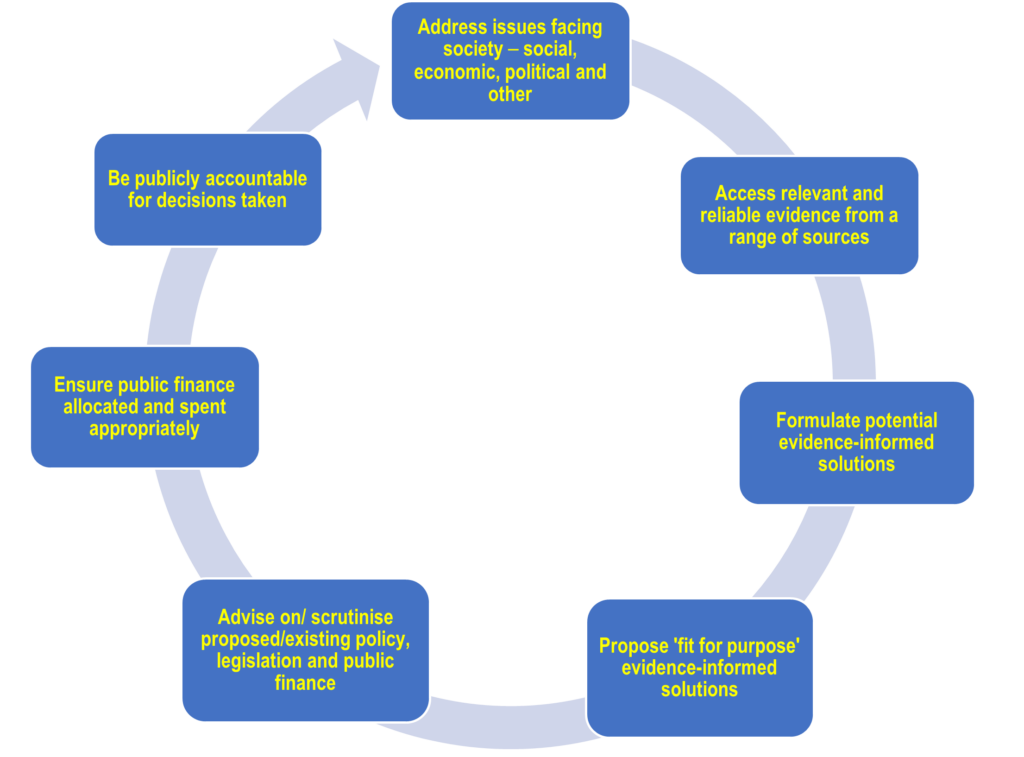The Assembly’s Research and Information Service (RaISe) partners with academia and other academic institutions under its ‘Programme of Academic Engagement’. Knowledge Exchange (KE) activities play a central role in delivering the Programme. Read on to learn more about why and how RaISe carries out those KE activities…
Why do MLAs and Assembly officials access and use academic findings and expertise?
Specified roles and responsibilities
The legislative roles and responsibilities of Members of the Legislative Assembly (MLAs) are largely set out in legislation by the Northern Ireland Act 1998. Simply stated, MLAs fundamentally are to:
- Hold the Northern Ireland Executive (including Departments) to account for its decisions;
- Enact legislation to make new laws or to amend existing; and,
- Debate and decide on issues raised in the Assembly.
When doing so, MLAs sit in three distinct capacities – namely plenary (Assembly sittings), committee (Statutory, Standing or Ad Hoc) and constituency – and:
- Represent the views and interests of the people of Northern Ireland;
- Help to meet societal needs;
- Support the delivery of public services; and,
- Help to maintain the ‘rule of law’.
That means MLAs are to undertake key actions when working in their three capacities, supported by Assembly officials, as highlighted in Figure 1 below:

As Figure 1 highlights, when working in Assembly plenary, committee and constituency, MLAs are expected to undertake various actions. They are to routinely address issues facing Northern Ireland society – including social, economic, political and other issues. To do so in a responsible and effective manner, they access and use relevant and reliable evidence from a range of sources. That evidence facilitates MLAs’ formulation of potential evidence-informed solutions which are ‘fit for purpose’: solutions that appropriately address the issues and are compliant with prevailing legal and other applicable standards; while also delivering value for money. MLAs then are to propose those solutions, for example, bringing a Bill, a Motion, a suggested Committee inquiry, a proposed Committee report recommendation or other.
In addition, MLAs are to advise on and scrutinise both proposed and existing policy, legislation and public finance, as put forward by a Departmental Minister or another elected Member. MLAs’ advice and scrutiny may take the form of, for example, a MLA bringing a Motion to an Assembly plenary, or asking a Departmental Minister about a matter via an Assembly Question, or questioning Departmental officials or other witnesses.
MLAs also are to take action, to ensure that public finance is allocated and spent appropriately, in a manner that represents value for money.
Moreover, and importantly, MLAs are to be publicly accountable for their decisions and related actions/inactions. That is done in various ways, such as:
- In Assembly plenary or committee when questioned about their proposed bills or other matters;
- At their constituency offices when addressing individual constituents’ concerns;
- When providing evidence to public inquiries or Assembly committees;
- While addressing media questions; and,
- Through the ballot box at elections.
Reasons why MLAs take such actions
Fundamentally, MLAs undertake the actions highlighted above, when carrying out their legislative roles and responsibilities. Other related motivations may be to:
- Raise public interest in an area;
- Build knowledge amongst fellow MLAs and the public, to inform a view;
- Obtain additional information to inform their future potential work;
- Challenge an Executive/Departmental implementation of policy or allocation of spending;
- Provide balance for more considered debate;
- Enhance their or their political parties’ public image; and/or,
- Secure electoral votes.
Unique research and information needs of MLAs
It is important to recognise that MLAs typically carry out their work as generalists, not specialists, supported by Assembly officials and others. Their work requires them to simultaneously consider a broad range of issues – often contested and complex. This is illustrated well since the resumption of fully functioning devolved governance in Northern Ireland in February 2024. During that time, MLAs have faced a long list of diverse and challenging socio-economic issues facing their constituents (individuals and businesses), and seemingly becoming increasingly acute since the Chancellor’s Autumn Budget in October 2024. Those issues concern: on-going inflationary pressures; costs-of-living increases; raised levels of poverty and social inclusion; recurrent pay disputes in the public sector; business uncertainties following the Chancellor’s Autumn Budget in October 2024, such as increased employer National Insurance Contributions and changes to both business asset disposal relief and inheritance tax; increased public service demands, for example, hospital waiting lists and Special Educational Needs placements; amongst many others.
Multiple and broad-ranging, competing priorities, with limited budget, naturally present difficult choices for MLAs. For the foreseeable, MLAs’ choices are even more challenging given the budget gap facing the Executive for this financial year, along with Executive budgetary requirements, as specified by central government in February 2023, including those relating to public services transformation and budget sustainability.
To guide those choices, MLAs have unique research and information needs, which are informed by a broad range of robust and reliable data sources. Amongst such sources are those that are balanced and independent, as well as based on rigorous, systematic studies and meta analyses that employ sound research methods and techniques; yielding evidence-based findings that are peer reviewed – for example, academic publications. Research findings and expertise provided by individual academics, early career researchers and doctoral students offer MLAs rich and reliable sources when presented in an accessible and timely format. For example, they facilitate MLAs and officials when:
- Seeking to identify information that is pertinent to the issues and the choices that MLAs face;
- Teasing out those issues, including relevant sub-issues, to understand potential/actual social, economic, financial, political and/or other impacts of existing/proposed policy, legislation and public finance;
- Identifying key ‘linkages’ of research findings to what the MLAs are considering;
- Explaining inadequacies in the existing evidence base, including information and data gaps; and,
- Proposing potential solutions to a given issue, including possibilities of how best to balance competing demands, interests and priorities.
So, how do RaISe KE activities facilitate access and use of academic findings and expertise for MLAs and Assembly officials?
Formally partnering with academia and other institutions, RaISe provides a ‘Programme of Academic Engagement’, with the dual aims of:
- Promoting evidence-led policy and law-making in Northern Ireland; and,
- Nurturing an applied research culture in Northern Ireland.
It does so through specific KE activities – alongside or in addition to all the other work that RaISe does. These activities seek to:
- Demystify devolved governance in Northern Ireland, including an overview of the institutional and the financial arrangements;
- Deepen knowledge and understanding about the operation of those arrangements; and,
- Increase awareness of topics that are relevant to existing/proposed policy, legislation and public finance in Northern Ireland, from an Assembly perspective.
Examples of KE activities are featured in Table 1:
Knowledge Exchange Seminar Series (KESS)
|
Potential witnesses and specialist advisors
|
Themed workshops/seminars at universities
|
United Kingdom Research and Innovation (UKRI) PhD Policy Internships Scheme
|
Partnering with UKRI, Research Councils, university networks and other
|
Inter-Parliamentary Knowledge Exchange Group (IPKEG)
|
Table 1: Assembly RaISe KE activities; source: RaISe (2024)
Effects of KE activities
To date, despite the challenges presented by interrupted devolution in Northern Ireland, RaISe KE activities have, and continue to:
- Support MLAs when carrying out their Assembly roles and responsibilities – that is, when undertaking routine actions in their plenary, committee and constituency capacities, as detailed earlier;
- Increase knowledge and understanding of devolved governance in Northern Ireland amongst academics, early career researchers and doctoral students – including: demystifying prevailing devolution arrangements (institutional/financial); existing/proposed policy, legislation or public finance; and, the Assembly’s unique research and information needs;
- Enhance academics’ future engagement with Assembly audiences – for example, when providing a written or an oral presentation of academic findings to an Assembly Committee;
- Create ‘safe spaces’ to support engagement on academic findings amongst a wide spectrum of individuals in Northern Ireland, including MLAs, to amplify the potential public value benefit of academic findings and expertise, in order to facilitate evidence-based analysis of public problems, and in turn the formulation of evidence-led solutions to such problems;
- Support participatory democracy and deliberative democracy;
- Maximise ‘value for money’ of academic research funded by UKRI/individual Research Council or The Executive Office/Department; and,
- Foster potential future opportunities for contact and collaboration between academia and the Assembly, such as MLAs, Committees and RaISe.
Going forward, RaISe will continue with its KE work, including resuming KESS, hosting UKRI interns and introducing new activities. If you would like to be in touch for additional information, please don’t hesitate to contact us at: [email protected].


